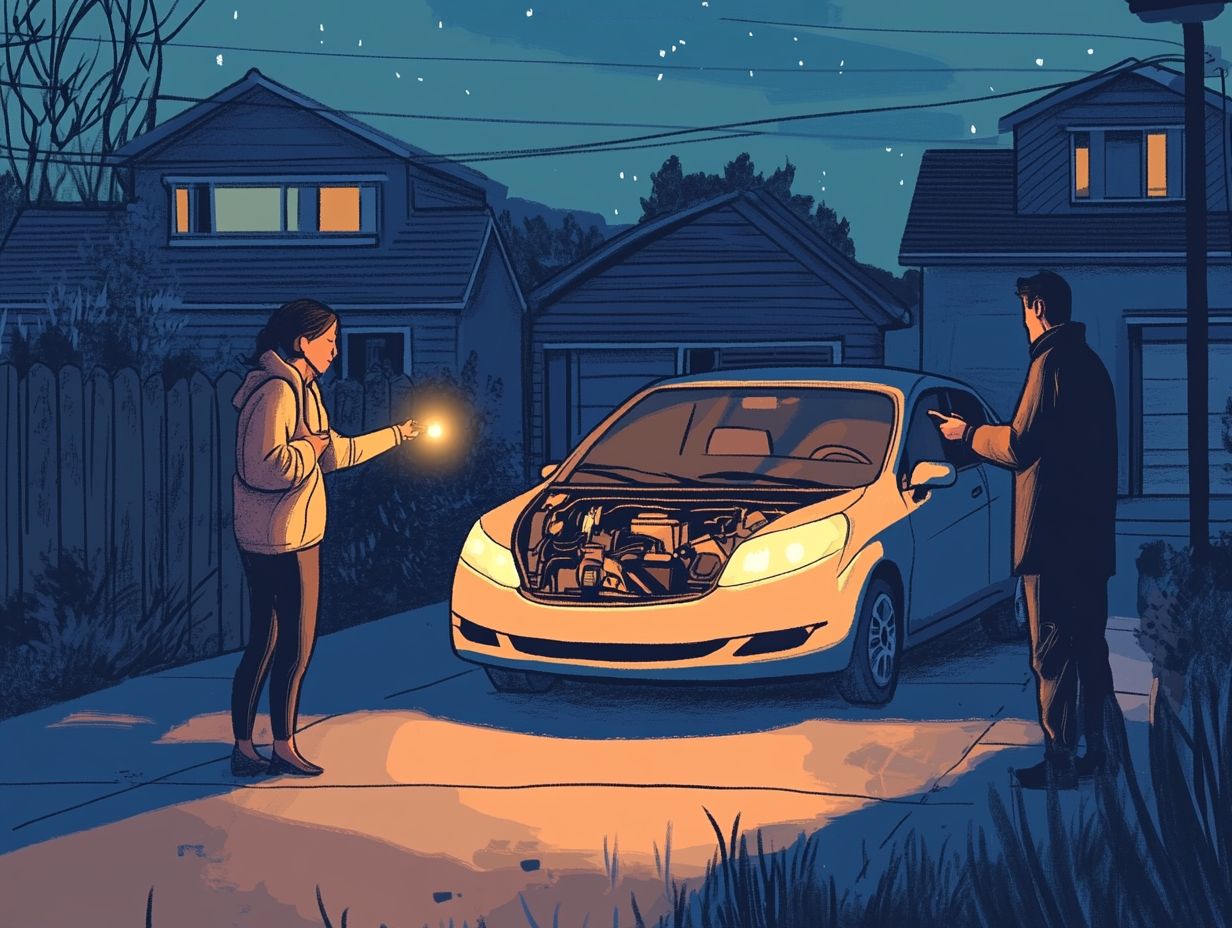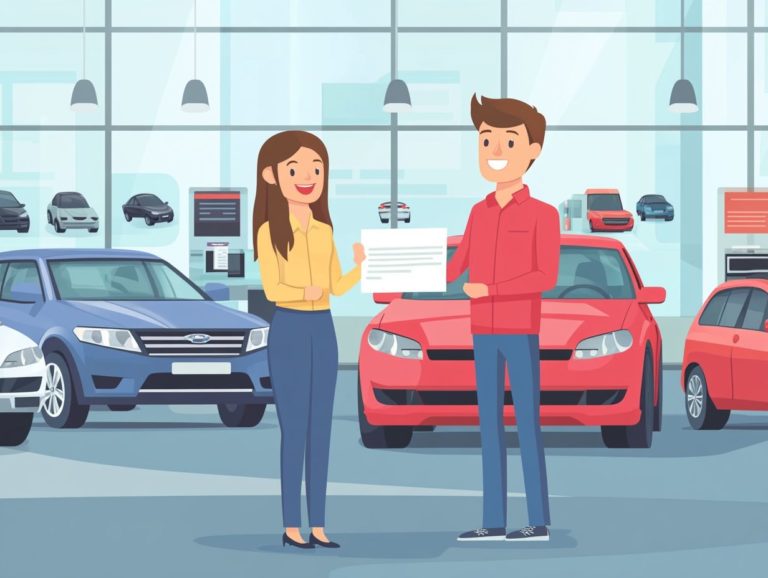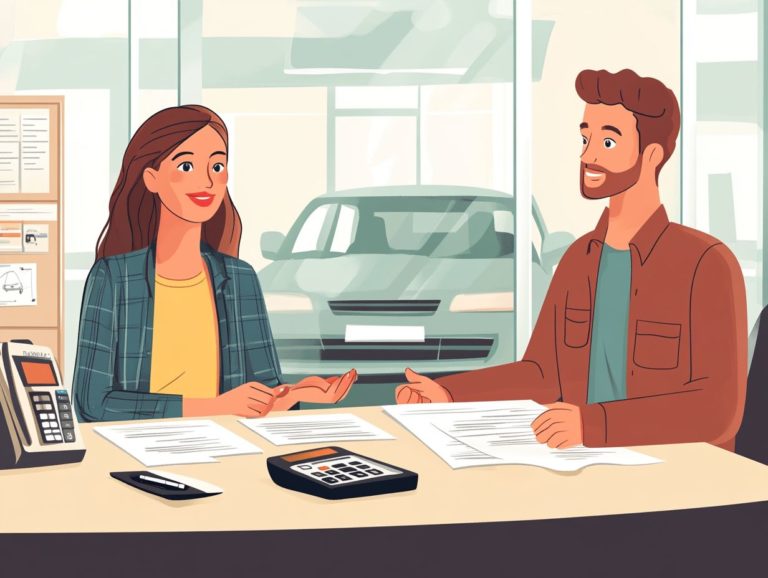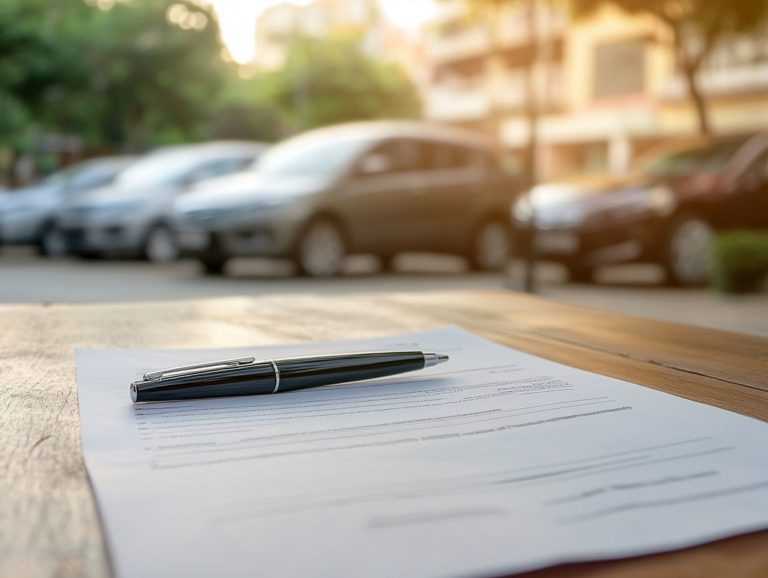5 Tips for Buying Used Cars from Private Sellers
Thinking of purchasing a used car from a private seller? This can be a savvy decision, often leading to better deals than what you d find at dealerships.
Navigating this process requires understanding the market. Careful consideration of various factors ensures you re making a wise investment.
From researching the car s market value to negotiating payment terms, this guide gives you essential tips to help you make an informed purchase.
You will explore the benefits and risks, identify red flags to be mindful of, and familiarize yourself with the legal requirements involved. Dive in to empower your buying journey!
Contents
- Key Takeaways:
- 1. Research the Car and Its Market Value
- 2. Ask for Maintenance and Repair Records
- 3. Take the Car for a Test Drive
- 4. Get a Pre-Purchase Inspection
- 5. Negotiate the Price and Payment Terms
- What Are the Benefits of Buying a Used Car from a Private Seller?
- What Are the Risks of Buying a Used Car from a Private Seller?
- What Should You Look for in a Used Car?
- What Are the Red Flags to Watch Out for When Buying a Used Car from a Private Seller?
- How Can You Protect Yourself When Buying a Used Car from a Private Seller?
- What Are the Legal Requirements for Buying a Used Car from a Private Seller?
- Preguntas Frecuentes
- Cu les son los beneficios de comprar un auto usado a un vendedor privado?
- C mo encontrar vendedores privados que venden autos usados?
- Qu buscar al inspeccionar un auto usado de un vendedor privado?
- C mo hablar sobre el precio con un vendedor privado?
- Debo obtener un informe del historial del veh culo al comprar un auto usado de un vendedor privado?
- Qu precauciones tomar al comprar un auto usado de un vendedor privado?
Key Takeaways:

- Do your research on the car and its market value to ensure you are getting a fair price.
- Ask for maintenance and repair records to get a better understanding of the car’s history.
- Always take the car for a test drive to assess its condition and performance.
1. Research the Car and Its Market Value
Before you dive into the car-buying process, it’s essential to conduct thorough research on the used car and its market value. This helps you make an informed decision, especially when dealing with a private seller or a car dealer. If you’re considering auctions, check out these tips for buying used cars at auctions.
By leveraging resources like vehicle history reports from Carfax or AutoCheck, you can accurately determine the fair market value of the vehicle. Compare its asking price with similar listings in classified ads or local dealerships.
Take the time to evaluate the vehicle’s condition and examine its repair history. This can uncover potential red flags that might impact the price.
Online valuation tools like Kelley Blue Book and Edmunds provide insights into what similar cars are selling for. This helps you develop a comprehensive understanding of the financial landscape.
Be sure to familiarize yourself with any safety concerns, such as recalls or past accidents. Understanding these details helps you negotiate better and ensures you buy a car that fits your budget and safety needs.
2. Ask for Maintenance and Repair Records
Requesting maintenance and repair records is an essential step when buying a used vehicle. These documents offer invaluable insights into the car’s overall condition and can reveal potential expenses you might face down the road.
By reviewing these records, you can assess whether the vehicle has received regular upkeep, which directly influences its resale value and reliability.
A well-maintained car provides a smoother driving experience and signals to future buyers that it s a sound investment.
Engage with the seller by asking specific questions about past maintenance, like oil changes or brake replacements, as well as any available warranties. Understanding these details can boost your confidence in the purchase and potentially save you money on repairs later on.
3. Take the Car for a Test Drive
Taking the car for a test drive puts you in the driver s seat quite literally! This step is your chance to see if the car lives up to your hopes.
During this experience, it s key to focus on various factors. Notice how the car handles on different terrains, the comfort level in both the driver and passenger seats, and the noise levels inside the cabin while driving.
A smooth ride with minimal distractions enhances your enjoyment and makes it easier to envision the car as part of your daily life.
Evaluating these elements helps you forge a personal connection with the vehicle. It also strengthens your position in negotiations. Pointing out any discomforts or concerns during the test drive may give you leverage to negotiate a more favorable purchase price or request additional services.
4. Get a Pre-Purchase Inspection

Have a professional mechanic inspect the car before you buy it. This crucial step helps you find hidden issues that could affect the vehicle s condition and your wallet.
This inspection checks the car’s repair history and reveals potential warranty concerns that may arise later.
By reviewing the car’s past maintenance records, you can make informed decisions and avoid unexpectedly costly repairs.
With detailed findings from the inspection, you gain leverage during negotiations.
You can confidently address necessary repairs or factor in the costs of upcoming maintenance, ensuring you secure a fair deal that truly reflects the vehicle’s condition.
5. Negotiate the Price and Payment Terms
Negotiating the price and payment terms is crucial when buying a used car. It helps you secure a fair price that matches the vehicle’s market value and fits within your budget.
Start your negotiation below the asking price to create a positive atmosphere. This approach opens the door for dialogue that benefits everyone involved.
Also, consider the trade-in value of your current vehicle; it can significantly impact the overall cost of your purchase.
Explore various financing options, as lenders often provide competitive rates. Doing your homework can lead to favorable terms that work in your favor.
Finally, ensure all your discussions lead to a legally binding agreement. A well-drafted purchase agreement finalizes the deal and provides peace of mind for both you and the seller.
What Are the Benefits of Buying a Used Car from a Private Seller?
Buying a used car from a private seller often offers several benefits. You’ll typically find lower prices compared to dealerships, which boosts your leverage and opens the door for better negotiation opportunities. For those considering electric vehicles, check out these 5 tips for buying used electric cars.
This can lead to reduced expenses and greater satisfaction in your vehicle ownership journey. Engaging directly with sellers fosters transparent communication and allows you to dig deep into the vehicle’s history.
This kind of direct dialogue creates a more personalized buying experience, allowing you to assess the car’s condition in ways that dealerships may not facilitate.
With flexibility in payment options usually found in private sales, you have the power to negotiate terms that align with your budget.
Such advantages contribute to stronger consumer protections, especially when sellers are open about the vehicle s past, ensuring you can make informed decisions.
What Are the Risks of Buying a Used Car from a Private Seller?
While purchasing a used car from a private seller can have perks, it’s essential to recognize the associated risks. You might encounter potential warranty issues or complications with title transfer if the vehicle history report raises any red flags. It’s wise to consider 5 tips for buying used cars with high mileage to mitigate these concerns.
Be mindful of common pitfalls that can come with peer-to-peer transactions.
One significant risk is the possibility of inaccurate representations regarding the vehicle s condition, leading to unexpected repairs.
Unlike purchasing from a traditional dealership, where consumer protections are typically stronger, buyers in private sales often find themselves with minimal recourse.
In some cases, lemon laws might apply, leaving you frustrated if issues arise shortly after your purchase.
To safeguard against these risks, conduct thorough research, obtain a comprehensive vehicle history report, arrange for a professional inspection, and consider following negotiation tips for used car buyers to secure a written agreement that clearly outlines the terms of the transaction.
What Should You Look for in a Used Car?

When you re considering purchasing a used car, evaluate several key factors. These include the vehicle’s condition, maintenance records, and repair history to ensure it meets your standards and safety requirements.
Have a detailed inspection list handy. This should cover aspects like the condition of the exterior and interior, tire health, and any visible leaks that could indicate underlying problems. Pay close attention to the car’s paint for inconsistencies and check the tires for even wear.
A trustworthy inspection service can be incredibly valuable. They can verify the seller s claims and reveal hidden defects. By engaging professionals, you gain peace of mind, knowing that the vehicle you re considering is a wise investment and free from unexpected costs down the road.
What Are the Red Flags to Watch Out for When Buying a Used Car from a Private Seller?
Identifying red flags when buying a used car from a private seller is essential for protecting yourself from potential fraud or regrettable investments. While this is crucial, first-time buyers should also consider 5 tips for first-time new car buyers to make informed decisions. Watch for inconsistencies in the unique number assigned to each car and unclear title status.
Be cautious of asking prices that seem too good to be true; they often suggest hidden problems. The absence of maintenance records is another significant warning sign, indicating the car may not have received proper care.
If the seller hesitates to negotiate or provide important information, this raises red flags about the vehicle’s condition.
To protect yourself from these pitfalls, conducting thorough due diligence through comprehensive vehicle history reports is vital. These documents can unveil crucial insights into past accidents, ownership changes, and service records, ultimately enabling you to make well-informed decisions.
How Can You Protect Yourself When Buying a Used Car from a Private Seller?
To safeguard yourself when purchasing a used car from a private seller, take a few precautionary steps. Ensure proper title transfer, verify your sales tax obligations, and consider these 5 ways to save money on a used car purchase. Obtaining a detailed vehicle inspection will help avoid future warranty headaches.
Beyond these initial measures, drafting a detailed purchase agreement outlining all terms of the sale is wise. This document is a must-have to protect your investment! It s also vital to confirm the seller s identity to ensure they re the legitimate owner, significantly reducing the risk of fraud.
Conduct thorough research on local vehicle sales laws. This knowledge will empower you regarding your rights and responsibilities.
Prioritizing transparency throughout the transaction fosters trust and contributes greatly to a smoother buying experience.
What Are the Legal Requirements for Buying a Used Car from a Private Seller?
Know the legal requirements for buying a used car from a private seller. This knowledge ensures a smooth transaction, including proper title transfer, vehicle registration, and payment of any applicable sales tax. For more details, check out our guide on how to approach a used car purchase.
Start by securing a bill of sale, a written record of the sale that includes details about the transaction. Once you have this crucial paperwork, verify the seller’s information. Ensure they are indeed the rightful owner and that there are no liens against the vehicle.
Confirm that the vehicle complies with local regulations, including emissions standards and necessary inspections. Being aware of your consumer rights is equally vital, as it allows you to pursue recourse if the vehicle fails to meet promised conditions or is misrepresented during the sale, thus safeguarding your investment.
Preguntas Frecuentes

Cu les son los beneficios de comprar un auto usado a un vendedor privado?
Hay varios beneficios al comprar un auto usado a un vendedor privado. Estos incluyen precios potencialmente m s bajos, la capacidad de negociar directamente con el vendedor y una selecci n m s amplia de veh culos. Los vendedores privados tambi n son menos propensos a agregar tarifas o cargos adicionales.
C mo encontrar vendedores privados que venden autos usados?
Encontrar vendedores privados que venden autos usados es simple. Puedes revisar sitios como Craigslist o Facebook Marketplace, pero es crucial saber cómo evitar estafas al comprar autos usados.
Tambi n pregunta a tus amigos o familiares. A veces, una conducci n por tu vecindario puede revelar letreros de “en venta” en autos estacionados.
Qu buscar al inspeccionar un auto usado de un vendedor privado?
Revisa la condici n general del veh culo. Observa el exterior, el interior, el motor y los neum ticos.
Pide los registros de mantenimiento. No olvides hacer una prueba de manejo para evaluar su rendimiento.
C mo hablar sobre el precio con un vendedor privado?
Hablar sobre el precio con un vendedor privado es parecido a hacerlo con un concesionario. Investiga el valor de mercado del auto como punto de partida.
Si el vendedor no acepta tu precio, prep rate para irte. Mant n el respeto durante toda la negociaci n.
Debo obtener un informe del historial del veh culo al comprar un auto usado de un vendedor privado?
Debes obtener un informe del historial del veh culo. Este informe revela datos importantes sobre el auto.
Te ayudar a conocer su historia, cualquier accidente previo y problemas pendientes. As , podr s tomar una decisi n m s informada.
Qu precauciones tomar al comprar un auto usado de un vendedor privado?
Toma precauciones al comprar un auto usado. Re nete en un lugar p blico y lleva a un amigo contigo.
Inspecciona bien el auto y aseg rate de tener toda la documentaci n necesaria. Investiga al vendedor y, si puedes, haz que un mec nico lo vea antes de comprarlo.






